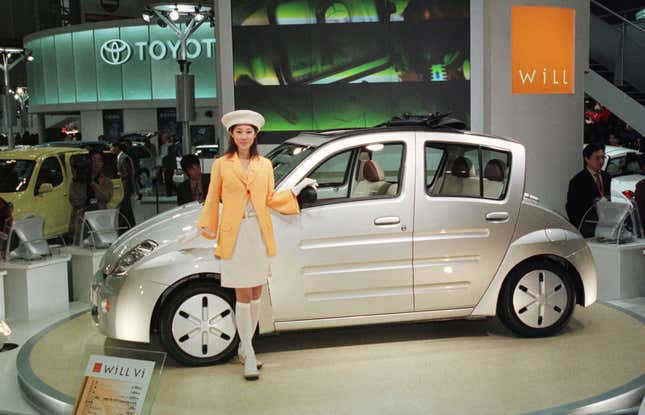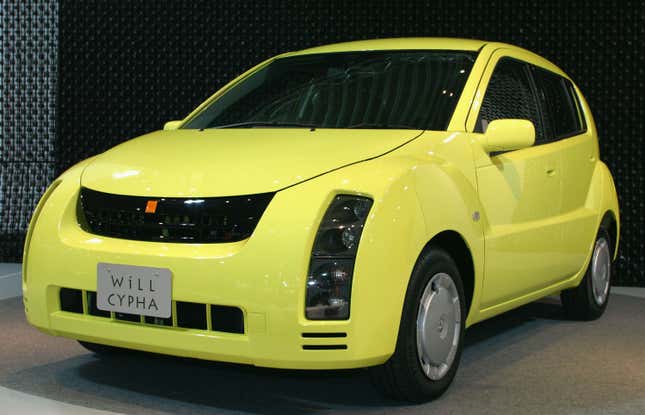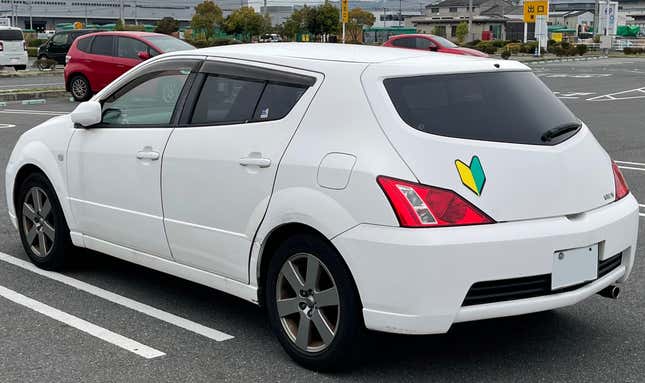These Three JDM Toyotas You've Never Heard Of WiLL Let You Live Your Y2K Fantasy

The turn of the 21st century was an exciting time, as the world was thrust into the futuristic-sounding year 2000. Toyota wanted to make a splash in the new millennium with its funky WiLL vehicles. Don’t beat yourself up if you don’t recognize these wacky little cars; they were only sold in small numbers in Japan for a few years, but I remember seeing them in Japanese car magazines on the Barnes and Noble magazine rack as a kid, and I finally got curious enough to investigate their story.
The 2023 Dodge Challenger Swinger Edition Was The Most Fun Car Of The Year
Developed as the result of a joint venture between Toyota and several other Japanese companies, WiLL was intended to be a family of products aimed at those elusive and trendy millennials who wanted products that express their individuality. Other companies that produced WiLL-branded products include Asahi Brewery which produced a WiLL beer, and Matsushita Electric Industrial Company which produced a WiLL PC and refrigerator. Toyota’s contribution was three specially designed small cars intended to appeal primarily to women in their late 20s, the WiLL Vi, the WiLL Cypha, and the WiLL VS, with the Vi and VS names pronounced as letters, like “vee-eye” and “vee-ess.”
Readers may also remember Toyota’s American-market attempt to lure younger buyers into its showrooms, a funky little sub-brand called Scion. Similar to the Scion recipe, Toyota dreamed up the JDM WiLL vehicles based on pre-existing Toyota platforms, so the Vi and the Cypha were both based on the JDM Toyota Vitz which was basically our Toyota Echo at the time, and the VS was based on the Corolla platform. The WiLL-brand vehicles were based on Toyotas but never had any exterior Toyota badges.

33Th Motor Show In Tokyo, Japan On October 20, 1999 – Toyota – Will VI vehicle.Photo: Kurita KAKU/ Gamma-Rapho (Getty Images)
I am always a fan of funky cars that take styling and design risks, and the WiLL trio is no exception. They may all be based on boring Toyota platforms, but at least they looked distinctive and exciting, something that couldn’t be said of the standard Toyotas at the time. This video shows more of both the WiLL Vi and the Cypha, though it is not in English and there are no English subtitles available, but it’s still cool to see!
豐田失敗作?Toyota WiLL Vi & Cypha同Echo本是同根生 何解WiLL品牌會慘淡收場? | Flat Out Review #FlatOut試車 #地板油
The WiLL Vi is the most comprehensively outstanding design of all the WiLL cars, looking simultaneously adorable, neo-retro, funky, and kinda ugly in some ways. In a perfect world, I would love to see the front end of the Cypha slapped onto the body of the Vi to make the weirdest Y2K Matrix-esque futuristic compact car possible, but the WiLL trio all come together as a quirky and distinctive trio. The back end of the Vi showcases some of the strangest design concepts I have seen put into production, with the inverted rear window that tucks inward immediately behind the rear headrests. This design forces an awkward trunk design with external hinges, something from a much earlier time.

On the interior, the WiLL Vi showcases a cozy space with a column-mounted shifter for the standard automatic transmission that frees up space for a couch-like front bench seat. The colors and materials used in the interior are also out of Toyota’s norm, with brown details, thoughtful fabrics and funky corrugations throughout. I love that many JDM cars lean fully into the lounge-like vibe foregoing any pretense of sportiness. I probably wouldn’t buy one since I find joy in driving, but I really appreciate the commitment to framing a car interior as a comfy place to hang out.

Toyota’s Will CYPHA is on display at a press conference on October 21, 2002 in Tokyo, Japan. Photo: Junko Kimura (Getty Images)
The Cypha is a slightly more traditional take on the same platform as the Vi, with a standard hatchback design replacing the Vi’s wacky bustle back. Where the Vi’s weirdest attributes are seen from the rear, the Cypha’s front end turns heads. With four large vertically oriented smoked front lights that stretch from the bottom of the front bumper up into the blistered wheel arch, it has the face of an NPC car from GTA, and I love it. The interior was less groundbreaking than the Vi, with more traditional colors and materials, front bucket seats and a floor-mounted shifter.

The WiLL VS was based on the Corolla, and it leaned into the sporty side of life. With sharp styling that featured aggressive angles and a distinctive rear end, the exterior looks sufficiently aggressive, especially when viewed from behind. The rear end of the VS has an aggressive forward slant to it that makes the car look like a hot hatch despite its pedestrian powertrains. The interior looks very different than any Toyota interior I’ve ever seen, and almost seems like it should be wearing a Pontiac badge with all the aggressive touches and sharp angles.
The WiLL brand and Toyota’s vehicular contributions to it were not long for this world, unfortunately. The WiLL Vi was only produced in 2000 and 2001, the WiLL VS was only produced from 2001 to 2004, and the WiLL Cypha was only produced from 2002 to 2005. I don’t think Toyota needs shiny new sub-brands to release cool cars; Toyota would be just fine launching a bunch of wacky yet reliable little runabouts, maybe even more than starting a new brand. Starting a new brand to appeal to younger buyers feels cringe to me. Just embrace your weirdness and release exciting and frivolous cars for weirdos — I dare you.



